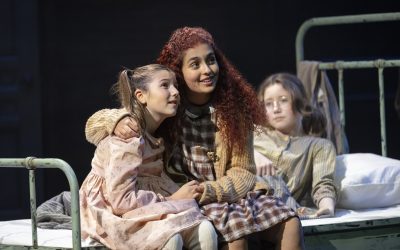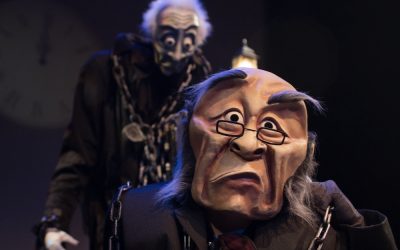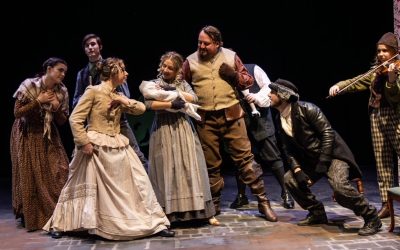
EVERYTHING HAS DISAPPEARED: PAKIKIRAMDAM! BRING IT ON!
Everything Has Disappeared is so original. I enjoyed it so much. Because, for starters, Hazel Venzon. I haven’t seen her onstage in years. Venzon’s Instagram bio might explain why: “Producer Director @unit productions sometimes I will act in plays or movies...
THE GOLDEN ANNIVERSARIES: A QUESTIONABLE INVESTMENT
Playwright Mark Crawford’s The Golden Anniversaries is not meanspirited, but it is boring and shallow. It’s Glen and Sandy Golden’s fiftieth anniversary but, about a week ago, Sandy kicked Glen out of the house and declared their marriage over. Now Glen is...
THE REPLACEMENT WIFE: COLOURING OUTSIDE THE LINES
It’s exhilarating to see somebody colouring outside the lines for a change. Aaron Bushkowsky’s new play, The Replacement Wife, is a reality-bending comedy about marriage, death, and the fickle nature of love. Its pieces didn’t come together for me in a substantial way...
YOU’RE JUST A PLACE THAT I KNOW: BUT NOT WELL, APPARENTLY
In the theatrical concert You’re Just a Place That I Know, singer/songwriter Adrian Glynn McMorran sets out to tell the story of his grandparents’ flight from Ukraine, post-WWII, to Montreal. But he doesn’t really know that story, so the core of this piece is hollow....
PARADISUM: NOT QUITE PARADISE
There’s an enormous amount of technical skill on display in Paradisum, which is a circus show from the Hungarian company Recirquel. But the level of artistry is inconsistent and that’s a problem: because circus is enjoying a huge renaissance these days, there are...
ANNIE: NOT EVERYTHING I WANTED FOR CHRISTMAS
Annie is the Gateway’s Christmas show, so let’s say this pudding is tasty sometimes, but also pretty lumpy. Stylistically, director Josh Epstein’s production is inconsistent — and that’s partly because, stylistically, Annie is a tricky musical. Based on the comic...
LOUISA MAY ALCOTT’S LITTLE WOMEN: SURRENDER
For some reason, probably general curmudgeonliness, I tried to resist Louisa May Alcott’s Little Women. I failed. Yes, the story is sentimental, but it’s about the importance of familial and romantic love — of kindness, honesty, and openheartedness. In this age, which...
A WONDERHEADS CHRISTMAS CAROL: ENOUGH ALREADY
I suggest a moratorium on adaptations of A Christmas Carol. We’ve had more than enough and some of them are good. In this variation from Victoria’s Wonderheads Theatre, there’s skill on display and some moments work but, as a whole, the evening is boring. The medium...
THE CRICKET ON THE HEARTH: GENEROSITY WINS OUT
Despite a bumpy start and hitches along the way, this journey is more than worth it. This United Players production is the premiere of a new adaptation, by Naomi Wright and director Sarah Rodgers, of Charles Dickens’s novella, A Cricket on the Hearth. The story, which...
Subscribe Free!
Sign up for the FRESH SHEET newsletter and get curated local, national, and international arts coverage — all sorts of arts — every week.
Contact
Drop a line to colinthomas@telus.net.
Support
FRESH SHEET, the reviews and FRESH SHEET, the newsletter are available free. But writing them is a full-time job and arts criticism is in peril. Please support FRESH SHEET by sending an e-transfer to colinthomas@telus.net or by becoming a patron on Patreon.
Website by Mighty Sparrow Design.










